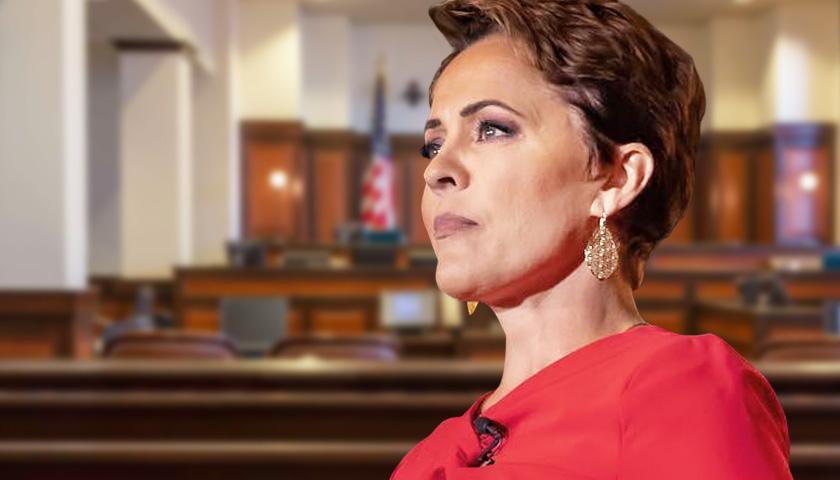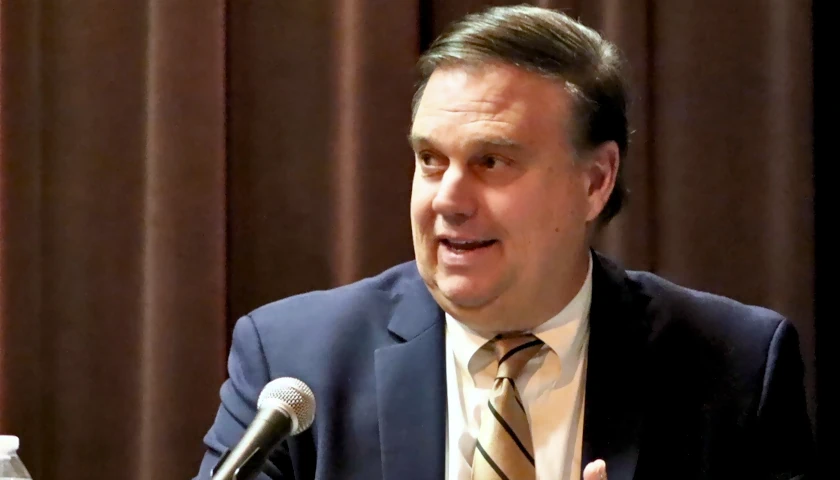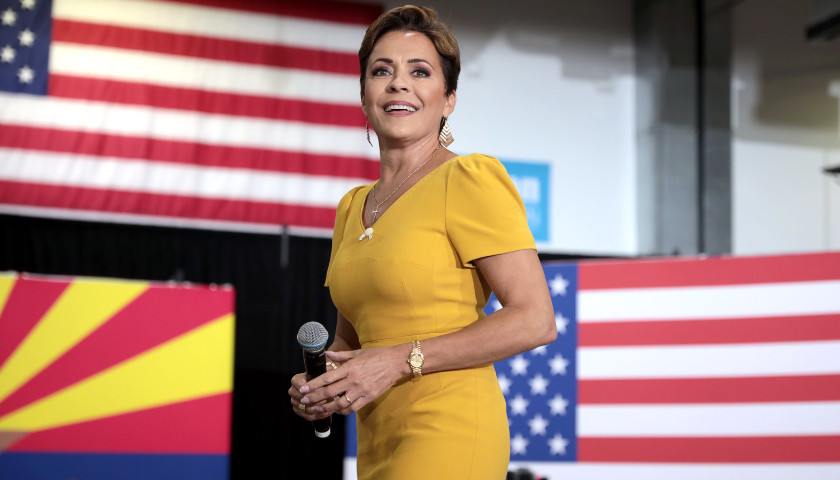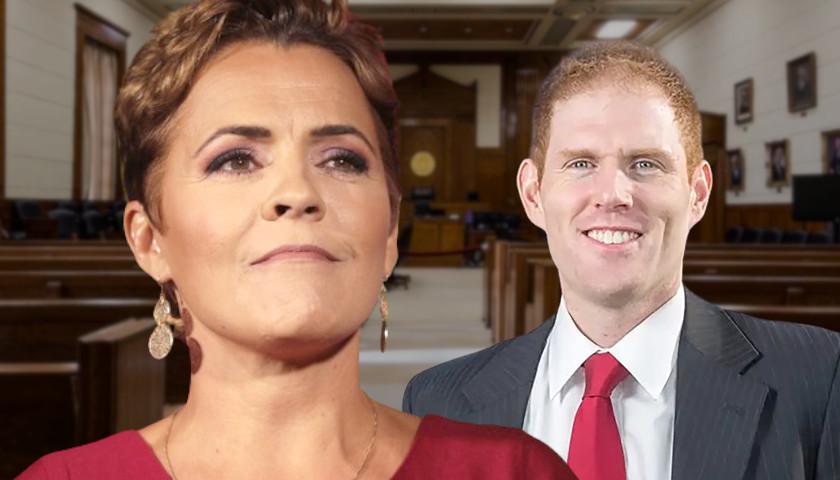Maricopa County Superior Court Judge Peter Thompson heard oral arguments Friday in Kari Lake’s election contest.
Thompson is considering a Motions to Dismiss filed by the defendants and a 263-page Motion for Relief from Judgment filed by Lake’s attorneys urging the court to bring back her second count regarding “illegal BOD printer/tabulator configurations,” which Thompson had previously dismissed.
The judge threw out Lake’s lawsuit in December, but the Arizona Supreme Court ordered him to reconsider the issue of signature verification problems.
Lake’s attorney Kurt Olsen told the court that new evidence produced shows there was “clear misconduct and intent.”
He said, “This evidence supports our allegation that the election was rigged.”
Thompson began hearing arguments addressing the Motion for Relief from Judgment first. Olsen said the new arguments are based on receiving new evidence; the system log files and tabulator records, which were only turned over to Lake’s team within the last few months, after the trial had been conducted.
Olsen said there were four new issues since the trial took place in December. First, he said the new evidence refutes the testimony of Maricopa County Elections Director Scott Jarrett regarding problems with ballots printing. The tabulators failed to recognize many of the ballots on Election Day because they were 19-inch ballots printed on 20-inch paper. Jarrett testified at trial on the first day that this problem did not happen. On the second day of trial, he testified that it had occurred, and said the county was performing a root-cause analysis, which was ongoing. Jarrett claimed that it was determined that some techs not authorized by the county made some changes to the printer configurations on site.
Olsen disputed this, “The new evidence shows this was absolutely false.”
He cited a declaration from cyber expert Clay Parikh, attached as an exhibit to Lake’s motion, which refuted this. Additionally, Olsen cited a report the county solicited from former Arizona Supreme Court Justice Ruth McGregor investigating the printing problem. He said McGregor found that while performing tests of the printers, some started misprinting, which no technical experts could explain. Olsen said since it happened with two different brands of printers, it was due to either malware or someone remotely accessing the printers.
Another false statement Olsen said Jarrett made was that the printing problem only happened in three vote centers, since random checks showed it occurred at a minimum of four. Robert Gouveia, an Arizona attorney who has covered Lake’s election contest extensively, said during a live video analysis discussing the hearing, “Jarrett lied on the stand.”
Olsen accused the county of lying about when the statutorily mandated Logic and Accuracy testing of the voting machines and printers were conducted, stating that they did not perform those tests until days later. Olsen said “new and compelling evidence” shows that “Maricopa falsely certified it passed Logic and Accuracy testing, and afterwards, secretly tested all 446 vote center tabulators on October 14th, 17th, and 18th, and knew that 260 of the vote center tabulators would fail on Election Day.”
Olsen said the county is now revealing that they didn’t configure the tabulators to accept early ballots and provisional ballots, so they went in and reconfigured them — without redoing the testing as required by statute, A.R.S. 16-449. He said they waited seven months to reveal that they reinstalled the software without testing it. As a result, Olsen said that voided all the tabulators.
Craig Morgan, attorney for the defendant secretary of state, provided the rebuttal argument. He asserted that Lake never brought up objections to the voting equipment in Count 2 of her original complaint, so she cannot address it now. He claimed that Lake is trying to amend her complaint now to add it, which is too late.
Morgan said the tabulators didn’t “fail.” He said ballots were merely misread because voters fed them in wrong, which “happens all the time.” He declared, “There was no massive failure of machines.”
Olsen responded back to Morgan’s claims, noting that the error codes that appeared in 260 tabulators when tested in October were the same error codes with roughly the same percentage rate of failure that occurred on Election Day. He accused Morgan, “Counsel wants to make you think it was just the result of somebody putting in a ballot incorrectly.”
Olsen refuted Morgan’s assertion that Lake was trying to amend her complaint after it was too late by pointing out that he wasn’t just bringing up that claim, he was alleging misconduct.
Gouveia noted that Katie Hobbs signed off and certified this activity as secretary of state.
Next, Thompson heard oral arguments on the defendants’ Motions to Dismiss. Abha Khanna, an attorney with the law firm of progressive attorney Marc Elias who represents Hobbs, argued that the case should be thrown out because the signature verification issue involved Level 1 reviewers who merely came to different opinions than the Level 2 reviewers about whether the signatures matched. She said anything related to the 2020 election is irrelevant. She said that to refute the testimony of election integrity analysts who provided evidence to the Arizona Legislature regarding similar signature verification issues in that election.
Morgan added that it’s too late for Lake to bring the challenge. He claimed that Lake changed her theory from challenging signature verification to saying that it didn’t occur at all. He said Lake was trying to fit under the Reyes analysis where they ordered a new election. In Reyes v. Cuming, a 1997 Arizona case involving similar circumstances, voters’ signatures on the envelopes were not compared to the voter registration list, which violated a non-technical statute. Morgan insisted that unlike in Reyes, signature verification did occur.
Olsen retorted back that he didn’t reframe his arguments. He said he argued last year that there weren’t enough minutes in the day to conduct signature review. Whistleblowers revealed that Level 1 reviewers were rejecting 25-40 percent of ballots. There were 24 Level 1 reviewers at any time, but only three Level 2 reviewers. Olsen estimated that for 1.3 million ballots cast in 2022, that meant up to over 500,000 ballots were rejected by Level 1 reviewers. He stated, “And as a consequence, clearly mismatched signatures which were not cured and were illegal were entered into the system.”
Olsen explained that the relevancy of 2020 is the large percentage of signatures on ballot envelopes that did not match the voters’ signatures. He said it corroborates their allegations in 2022. “This case is precisely like Reyes,” he said, “except it’s Reyes on steroids” due to the vast number of problematic ballots.
Olsen cited a report from April 2022 that then-Attorney General Mark Brnovich provided to the Arizona Senate providing his analysis of the 2020 election problems. Brnovich stated that analyzing ballots at a rate of 4.6 seconds per ballot is impossible.
Joseph La Rue, the attorney for Maricopa County, conceded there were problems with the county’s signature verification process. “It’s not really a hard and fast science,” he said. “If we would bring signatures in here, Your Honor, you might think some are consistent and I might think they were inconsistent or vice versa.”
There was a discussion at the end of the hearing about whether Lake’s experts should be allowed to testify at trial. Thompson said he issued an order which required the parties to provide a summary of what the experts intended to speak about, which Lake’s attorneys had not provided. Lake’s attorneys argued that they hadn’t provided any since Thompson had told them if they provide reports from expert witnesses, then they cannot also testify. Once her attorneys and Thompson hashed it out, with the defendants’ attorneys arguing that the experts should be kept out, Thompson gave Lake’s attorneys until 5 p.m. to provide supplementation providing the subject matter, opinions, and the bases for the opinions being disclosed.
Thompson said he would rule soon on the motions. If the Motion to Dismiss is not granted, a trial is scheduled for May 17 that is expected to last three days.
– – –
Rachel Alexander is a reporter at The Arizona Sun Times and The Star News Network. Follow Rachel on Twitter. Email tips to [email protected].
Photo “Kari Lake” by The Kari Lake. Background Photo “Courtroom” by Carol M. Highsmith.





